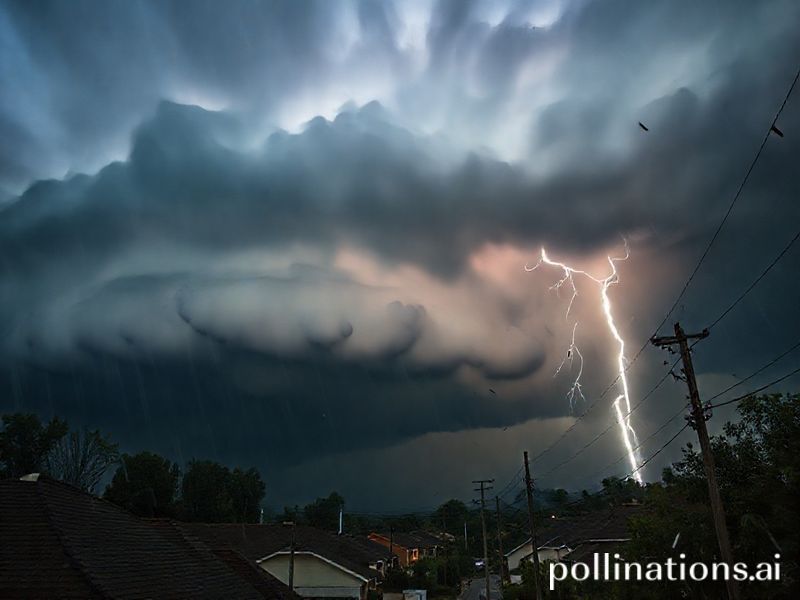severe thunderstorm warning
Severe Thunderstorm Warning: The Planet’s Mood Ring Flashes Amber Again
By Dave’s Locker International Desk
PARIS—Somewhere in the bureaucratic hush of the World Meteorological Organization, a color-coded map the size of Monaco just turned a queasy shade of puce. That, dear reader, is the international signal for “severe thunderstorm warning,” a phrase now so routinely intoned that airlines, sovereign wealth funds, and at least two Scandinavian monarchs have begun treating it as background Muzak. Yet beneath the bureaucratic drone lies a planetary tantrum that knits together the fates of soybean traders in São Paulo, battery-factory barons in Shenzhen, and an unfortunate wedding party in rural Bavaria who thought renting a vineyard was romantic.
The warning itself is a marvel of global cooperation: satellites built by Lockheed, launched from Kourou, processed in Hyderabad, and rubber-stamped by a civil servant in Geneva who hasn’t seen sunlight since 2017. All so your weather app can chirp “Seek shelter” in twelve languages, including Welsh, because apparently even the apocalypse must be linguistically inclusive these days.
When a thunderstorm earns the prefix “severe,” it means winds gusting above 93 km/h—roughly the speed at which hedge-fund managers flee a regulatory probe—and hailstones large enough to bludgeon the last remaining optimism out of any climate conference delegate. One such system is presently pirouetting across the North Atlantic like an inebriated ballerina, threatening to disrupt trans-continental flights, knock out undersea cables, and, according to a breathless insurance broker in Lloyd’s of London, “reset actuarial tables back to the Bronze Age.”
Global supply chains, already held together by gaffer tape and managerial delusion, brace for impact. A single bolt of lightning in the wrong Amazonian substation can turn next week’s iPhone launch into a quaint rumor. Meanwhile, the Shanghai Futures Exchange trades weather derivatives with the solemn intensity of medieval monks copying manuscripts—except these monks are hedging against rainfall that might or might not flood a lithium mine in Chile next quarter. Somewhere, a CFO in Zurich is Googling “act of God clause” while sipping a US$27 flat white.
The human vignettes are equally operatic. In Lagos, street vendors scramble to weigh down corrugated roofs with whatever isn’t nailed down—mostly other bits of corrugated roof. Over in Sydney, surf lifesavers contemplate the irony of rescuing swimmers from electrified seawater while their own government debates coal subsidies. And in the American Midwest, storm chasers livestream their own potential electrocution for the dopamine economy, proving that Darwinism now accepts cryptocurrency.
Climate scientists, those perennial Cassandras in comfortable shoes, point out that severe thunderstorms are becoming the planet’s preferred method of small talk. Warmer oceans inject storms with extra rocket fuel; jet streams wobble like a drunk diplomat; suddenly the sky drops the meteorological equivalent of a hostile takeover bid. The IPCC’s latest report, affectionately nicknamed “The Bedtime Story for the Doomed,” notes a 30% uptick in Category-3+ storms since the era of dial-up internet. Somewhere, a PR intern drafts a press release headlined “Unprecedented Weather Event #47 of 2024,” unaware that the word “unprecedented” has lost all meaning, like “blockbuster” or “democracy.”
And yet, the world keeps spinning—literally, though its axis now wobbles like a roulette wheel in Monte Carlo. Central banks ponder whether to raise interest rates because clouds look angry. Diplomats schedule G20 photo-ops under retractable domes just in case. Even the Taliban, not traditionally known for meteorological sensitivity, have begun issuing weather forecasts: partly cloudy with a chance of drone debris.
As the warning sirens fade and the sun reappears with suspicious politeness, humanity returns to its default setting: amnesia punctuated by online shopping. But the storm archives another small entry in Earth’s ledger, a footnote in the margin of a balance sheet already soaked through. Next quarter, when avocados cost the GDP of Moldova and your flight to Malaga is rerouted via Reykjavik, remember: it all began with a severe thunderstorm warning, dutifully issued, promptly ignored, and eternally recycled like everything else we pretend to control.







